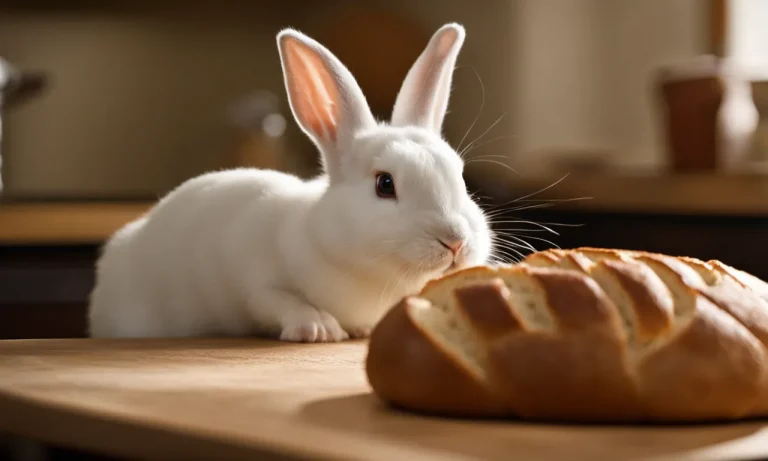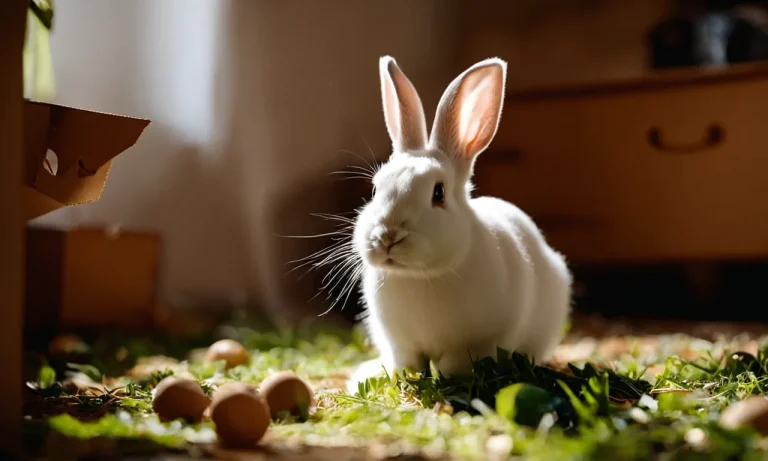Tomatoes are a popular fruit that add flavor and nutrition to many human foods, but what about our furry friends? If you’re a rabbit owner wondering ‘can bunnies eat tomatoes?’, you’ve come to the right place.
The quick answer is yes, rabbits can eat tomatoes, but only in moderation. Tomatoes contain nutrients that are beneficial for rabbits, but also contain compounds that can be harmful if consumed in excess.
Benefits of Tomatoes for Rabbits
When it comes to feeding your pet rabbit, it’s important to know which foods are safe and beneficial for them. One such food that often raises questions is tomatoes. So, can bunnies eat tomatoes? The answer is yes, but in moderation. Tomatoes can actually provide several key benefits for rabbits.
Tomatoes Provide Key Vitamins
Tomatoes are packed with vitamins that can support your rabbit’s overall health. They are particularly rich in vitamin C, which is essential for boosting the immune system and preventing illness. Vitamin C also plays a crucial role in collagen production, which helps maintain healthy skin and fur for your furry friend.
Additionally, tomatoes contain vitamin A, which is important for vision and reproductive health.
They Are a Source of Antioxidants
Tomatoes are known for their high antioxidant content, which can help protect your rabbit’s cells from damage caused by harmful free radicals. Antioxidants are important for preventing oxidative stress and reducing the risk of chronic diseases.
By including tomatoes in your rabbit’s diet, you can provide them with an extra dose of these beneficial compounds.
Tomatoes Have a High Water Content
Another benefit of tomatoes is their high water content. Rabbits require a diet that is rich in hydration to maintain proper digestion and prevent dehydration. Including foods with high water content, like tomatoes, can help ensure that your bunny stays properly hydrated.
This is especially important during hot summer months or if your rabbit is recovering from an illness.
It’s important to note that while tomatoes can provide these benefits, they should only be given as a treat and in moderation. Too much tomato can cause digestive upset in rabbits. It’s always best to introduce new foods slowly and observe how your rabbit reacts to them.
If you have any concerns about your rabbit’s diet, it’s recommended to consult with a veterinarian who specializes in small animals.
For more information about feeding rabbits, you can visit www.rabbit.org, a reputable website dedicated to rabbit care and information.
Potential Dangers of Feeding Tomatoes to Rabbits
Tomatoes Contain Solanine
One of the main reasons why bunnies should not eat tomatoes is because they contain solanine, a toxic substance. Solanine is a naturally occurring chemical found in the leaves, stems, and unripe tomatoes of the plant.
While ripe tomatoes have lower levels of solanine, it is still present in small amounts. Ingesting solanine can cause gastrointestinal distress in rabbits, leading to symptoms such as vomiting, diarrhea, and abdominal pain.
According to the American Society for the Prevention of Cruelty to Animals (ASPCA), solanine can also affect the nervous system, causing symptoms like tremors and seizures in rabbits. It is important to note that these effects can vary depending on the individual rabbit and the amount of solanine consumed.
Acidity Can Cause Digestive Upset
Another concern with feeding tomatoes to rabbits is their acidity. Tomatoes have a relatively low pH level, which can disrupt the delicate balance of a rabbit’s digestive system. Eating acidic foods can lead to gastrointestinal upset, including discomfort, bloating, and even potential damage to the digestive tract.
According to the Rabbit Welfare Association & Fund (RWAF), the high acidity of tomatoes can also contribute to the formation of bladder stones in rabbits. These stones can cause significant pain and discomfort for bunnies and may require veterinary intervention to resolve.
High Sugar Content
Tomatoes are relatively high in sugar compared to other vegetables that are safe for rabbits to consume. While rabbits can handle small amounts of sugar in their diet, excessive sugar intake can lead to weight gain, dental issues, and even an increased risk of digestive problems.
Rabbits have a unique digestive system that is designed for a high-fiber, low-sugar diet. Feeding them foods with high sugar content can disrupt their gut flora and lead to imbalances in their digestive health.
It is best to stick to vegetables that are lower in sugar and higher in fiber when it comes to feeding rabbits.
How Much Tomato Can a Rabbit Eat?
When it comes to feeding tomatoes to your bunny, moderation is key. While tomatoes can be a tasty treat for rabbits, they should only be given in small amounts. Too much tomato can cause digestive issues for your furry friend.
Tomatoes as an Occasional Treat
Tomatoes should be considered as an occasional treat rather than a regular part of your rabbit’s diet. A small slice or a few cherry tomatoes once or twice a week can be a great way to add variety to their meals.
Remember, rabbits have sensitive digestive systems, so it’s important to avoid overfeeding them with tomatoes.
Introduce New Foods Slowly
When introducing any new food to your bunny’s diet, including tomatoes, it’s important to do so gradually. Start by offering a small piece and observe your rabbit’s reaction. If they show signs of digestive upset, such as diarrhea or a change in appetite, it’s best to discontinue feeding tomatoes and consult with a veterinarian.
Additionally, rabbits have specific dietary needs, and their main diet should consist of hay, fresh vegetables, and a limited amount of pellets. Tomatoes should never replace these essential elements of their diet.
Monitor Your Bunny’s Reaction
Every rabbit is unique, and some may have different reactions to tomatoes than others. It’s important to monitor your bunny closely after feeding them tomatoes. Look out for any unusual behavior, digestive issues, or allergic reactions.
If you notice any negative symptoms, it’s best to avoid feeding tomatoes to your rabbit in the future.
Remember, it’s always a good idea to consult with a veterinarian before introducing any new food into your rabbit’s diet. They can provide you with specific guidance based on your bunny’s individual needs and health condition.
Tips for Safely Feeding Tomatoes to Rabbits
Wash Thoroughly Before Serving
Before feeding tomatoes to your beloved bunny, it is crucial to wash them thoroughly. This is to ensure that any harmful chemicals or pesticides are removed, as these can be harmful to rabbits. Washing the tomatoes under running water and gently scrubbing them will help eliminate any potential risks.
Remember, the safety and well-being of your furry friend should always come first.
Remove Stems, Leaves & Seeds
Prior to serving tomatoes to your rabbit, make sure to remove the stems, leaves, and seeds. These parts of the tomato can be difficult for rabbits to digest and may cause digestive issues. By removing these components, you are providing a safer and more enjoyable snacking experience for your bunny.
Slice or Dice to Make Them Rabbit-Sized
When offering tomatoes to your rabbit, it is important to make them rabbit-sized. This means slicing or dicing the tomatoes into smaller pieces that are easier for your bunny to handle and eat. By doing so, you are reducing the risk of choking and ensuring that your rabbit can comfortably enjoy their tomato treat.
Pair with Other Fresh Veggies
While tomatoes can be a tasty addition to your rabbit’s diet, it is essential to remember that they should not be the sole component. Rabbits require a varied and balanced diet to thrive. Therefore, it is recommended to pair tomatoes with other fresh vegetables that are safe for rabbits, such as leafy greens, carrots, and bell peppers.
This ensures that your rabbit receives a well-rounded and nutritious meal.
Remember, it is always best to consult with a veterinarian before introducing any new food to your rabbit’s diet. Each rabbit is unique, and their dietary needs may vary. By following these tips and seeking professional advice, you can safely incorporate tomatoes into your rabbit’s diet and provide them with a diverse range of nutritious foods.
Conclusion
In conclusion, domesticated rabbits can eat tomatoes in moderation as part of a balanced diet. The vitamins, minerals and water content make tomatoes a healthy snack. However, solanine, acidity and sugar mean tomatoes should only be fed occasionally and in limited quantities to prevent digestive upset.
By introducing tomatoes slowly, washing thoroughly, removing hazardous parts, and pairing with other veggies, you can safely allow your bunny to enjoy this tasty fruit.
While tomatoes make a great supplemental treat, the bulk of your rabbit’s diet should comprise hay, leafy greens and a small amount of rabbit pellets. With proper care and feeding, your furry friend can hoppily benefit from tomatoes!






